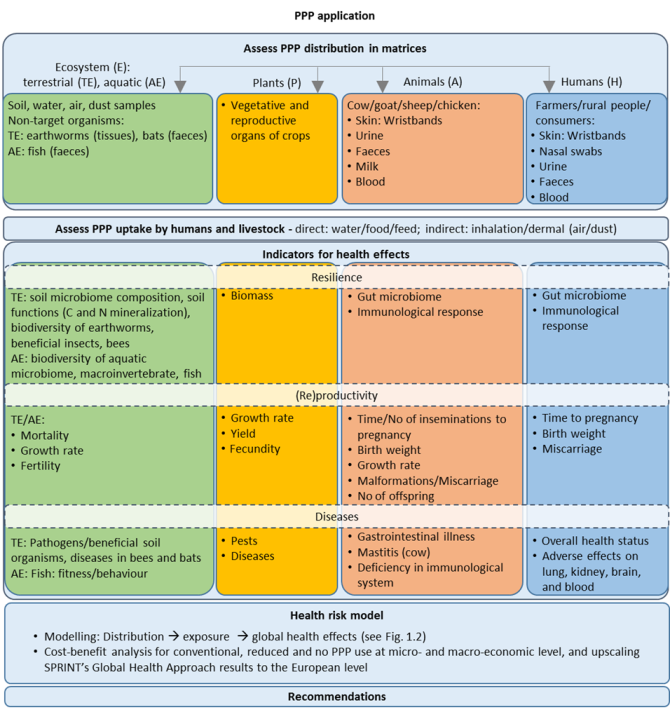SPRINT: Risks and impacts of pesticides on environment and human health (SSC)
This case study exemplifies the Soil Science cluster working beyond traditional soil science contexts, directly linking to human and environmental health. SPRINT illustrates possible collaborations within and beyond WUR for highly relevant research that contributes significantly to science and society.
Background
Most farmers rely on plant protection products (PPPs) to maximise crop yields. However, some PPPs potentially harm environments, animals and humans. Data on risks and impacts associated with PPPs are fragmented and incomplete. To address these data gaps, the Soil Physics and Land management group conceived and is coordinator of the SPRINT project which develops and tests an integrated global health approach to assessing risks and impacts of PPPs on environmental, plant, animal and human health. SPRINT entails a transdisciplinary consortium and close involvement of all relevant stakeholders. The project consists of 28 partner organisations in Europe and Argentina, with a total project budget of 15 million €.
SPRINT main objectives
- engage stakeholders to identify knowledge needs and improve awareness of and trust in integrated pesticide risk assessments
- assess PPP component mixtures & distribution in Environment, Plant, Animal and Humans (EPAH) and related health states in conventional, integrated and organic farming systems
- estimate direct & indirect PPP exposure levels in representative case studies sites (CSS)
- develop laboratory tests for measuring PPP mixture effects
- develop a Global Health Risk Assessment Toolbox for risk and impact assessment of PPP mixtures, linking exposure to health impacts
- assess integrated risks, costs and benefits of PPP use in different farming systems at micro- and macroeconomic level
- propose transitions towards sustainable plant protection, provide policy recommendations and develop a research agenda
Research approach
PPP mixtures’ distribution and impacts on EPAH health will be evaluated across 11 CSS with contrasting farming systems, covering main European crops, and soy production for feed in Argentina destined for European markets. Holistic attributes/indicators are used to characterise health status (Fig. 1). PPP mixtures, environmental fluxes and both direct and indirect animal and human exposure routes will be quantified to improve fate, exposure and toxicokinetic/toxicodynamic models. PPP distribution and health indicator relationships for ecosystems, animals and humans assessed across the CSS will be collated in order to provide a cause/effect consensus.
Improved (eco)toxicological assays will be performed based on CSS findings. The assays will cover direct and indirect exposure to multiple PPP residues, realistic ranges of PPP concentrations, multi-species scenarios and acute and chronic exposures.
SPRINT will be developed for integrated risk assessments at local, regional, national and European levels, focusing on conventional, integrated and organic farming systems and different environmental and socioeconomic conditions. Sustainability and cost-benefits modelling at micro- and macro-economic scale will be included to derive recommendations for sustainable transitions and a PPP research agenda. Stakeholders will be involved throughout the project.

Stakeholder involvement
Stakeholder platforms will use different engagement mechanisms. A detailed plan was prepared at the project’s outset, including mapping stakeholders to ensure actor representation (farmers, farm advisory services, rural residents, EFSA, industry, consumers, NGOs, public authorities, policy makers, civil society actors). Training events will be organised for case study partners on the monitoring activities, interviews and workshops to ensure quality and consistency in approaches to stakeholder involvement and collected evidence. In different project work packages, specific activity training and analysis related to gathering EPAH evidence, socio-economics and policy will be provided.
Link to education
SPRINT provides opportunities for BSc and MSc theses and internships, PhD students involvement, education-oriented case study site visits and student exchanges between SPRINT partner organisations. In addition, project results are used in different courses to provide students with state-of-the-art knowledge, insights and information.
Impact
Besides its academic impact, SPRINT will support several EU policies, from overarching strategies to pesticide regulations and policy evaluations:
- REFIT (regulatory fitness and performance programme) - an ongoing evaluation programme checking that EU legislation is 'fit for purpose'. SPRINT will address key areas identified as needing improvement (cumulative risk assessment, green diplomacy to promote a green pesticide agenda, better enforcement of Maximum Residue Level Regulation).
- Farm to Fork (F2F) strategy - central to the European Green Deal. SPRINT can feed into several of its aims - SPRINT will contribute to halving PPP use by 2030, to sustainable food production with a neutral or positive impact, to reverse biodiversity loss and to ensure food safety.
- Sustainable Use of Pesticides Directive (2009/128/EC) – aims to achieve sustainable use of PPPs in the EU by promoting use of integrated pest management and alternative approaches for controlling pests. SPRINT will contribute by identifying transitions towards reducing PPP reliance.